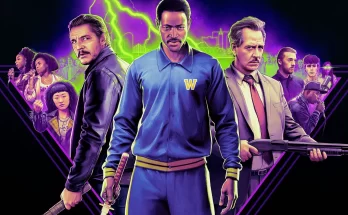Want to hear more from the actors and creators of your favorite shows and films? Subscribe to The Cinema Spot on YouTube for all of our upcoming interviews!
Managing editor & film and television critic with a Bachelor's of Arts in English Literature with a Writing Minor from the University of Guam. Currently in graduate school completing a Master's in English Literature.
Marcus McKenzie and Daniel Principe’s Last Meal gives the United States a brief lesson on the modern-day prison system. Under the name, Cinemâché, their short film documentary showcases an excellent mix of bright and colorful & dull and morbid.
This review will discuss their 17-minute and 33-second project. No spoilers will be included here, as the title of the article suggests — history isn’t comprised of made-up plot development.

Plot Summary
According to the Tribeca Film Festival site, here is the summary of the short film’s narrative:
The final feasts of death row inmates are served up in this investigation of capital punishment.
Below is the synopsis of the film via the directors’ press book.
Capital punishment simmers in a boiling pot of controversy. Amidst the political and religious debate surrounding the issue one thing sets tongues wagging more than the others – what do the condemned eat before their execution?
Narrated by Hugh Ross (The Assassination of Jesse James by the Coward Robert Ford), LAST MEAL presents a banquet of death row inmates’ final feasts and through them shines a light on our understanding of the individuals and the institutions meting out capital punishment.
Discussion
McKenzie and Principe understand the assignment. Last Meal contains much comprehensive research on death-row inmates. To add, we also get to learn about their crimes, social backgrounds, and of course, respectively requested last meals. Most of the documentary’s data have been cited in the end credits rather than in the scenes’ footnotes. These are located via Referenced Research, Video Excerpts, and Archival Materials. Still, I find this impressive.
Principe’s framing via cinematography, editing, and colouring makes the documentary come off as visually pleasing. Brendan and Natalie Homan’s food styling and production design add to the eye candy. On the audio aspect, Hugh Ross’s narration and Christopher Larkin’s musical composition and sound design can be quite calming. That is unless you absolutely do not want to be watching a film about people who’ve killed people.
Prisoners and some last meals featured in Last Meal
McKenzie and Principe include a good handful of prisoners in their documentary. Allow me to name just a few.
Famed serial killers John Wayne Gacy and Theodore Robert “Ted” Bundy are mentioned. (The former’s meal is located at the beginning of this article.) Other convicted killers, rapists, and terrorists include Timothy McVeigh, Adolf Eichmann, David Castillo, Ricky Ray Rector, Gary Gilmore, Jonathan Nobles, Joe Arridy, and Henry Lee McCollum.
Castillo’s last meal was a “Mexican feast.” Specifically, as per the film, this consisted of “24 tacos, 2 cheeseburgers, 2 whole onions, 5 jalapeño peppers, 6 enchiladas, 6 tostadas, 1 quart of milk, and 1 chocolate milkshake.” (You can find this in the thumbnail photo of this article.)
Rector’s last meal consisted of “steak, fried chicken, cherry Kool-Aid, and pecan pie.”
Final Thoughts
It was interesting to learn the historicity of death-row inmates over the past century. However, McKenzie and Principe do not stop there. They go as far back as referencing the 1692-93 Salem Witch Trials and even 30 to 36 A.D. They suppose that the term “last meal” originated from Jesus Christ’s crucifixion. (The Biblical figure has been famous for being pictured at the center of “The Last Supper.”)
Cinemâché also discusses the issues that stem from capital punishment, such as Antonin Scalia’s argument that “executing a factually innocent but duly convicted defendant was not unconstitutional”. There are very important lessons to be learned from this short film. I will state one, and it’s that food is more important to the average human body than we would think. (I paraphrase what Oregon Department of Corrections’ Stan Czerniak says, “When you lose so much of your freedom, things like food take on tremendous importance.”)
Overall, Last Meal is a splendid yet somewhat haunting short film and documentary. Although longer than other short films I’ve seen during this year’s film festivals, it is worth the watch!

Last Meal is available to watch at Tribeca Film Festival!
Have you seen this short film? If you have already, what are your thoughts on it? Let us know! For more documentary and political-related news and reviews, follow The Cinema Spot on Facebook, Twitter, and Instagram!
Managing editor & film and television critic with a Bachelor's of Arts in English Literature with a Writing Minor from the University of Guam. Currently in graduate school completing a Master's in English Literature.






21 Comments on “‘Last Meal’ (Tribeca) Short Film Documentary Review”